Overview
The main focus of this article is to gently highlight the importance of tailored therapy questions in promoting emotional growth for teens.
Have you ever felt overwhelmed by your feelings? These questions not only encourage self-reflection and emotional expression but also assist adolescents in navigating their feelings, relationships, and aspirations.
In doing so, they foster resilience and personal development, ultimately guiding young people towards a brighter future.
As we explore this further, it becomes clear that such supportive inquiries can be a powerful tool in a teen's journey of emotional healing.
Introduction
The emotional landscape of adolescence can often feel overwhelming, filled with challenges that seem insurmountable. As teens navigate their unique experiences, the right therapy questions can act as a guiding light, illuminating paths toward self-discovery and emotional growth.
- Have you ever felt overwhelmed by your feelings and aspirations?
- What if these carefully crafted inquiries could not only foster deeper connections but also empower young individuals to confront their emotions?
Exploring essential therapy questions for teens reveals a powerful tool in promoting resilience and understanding, ultimately shaping healthier emotional futures. As we delve into this topic, let’s consider how these questions can support our journey toward healing.
The Emerald Couch: Tailored Therapy Questions for Teens
At The Emerald Couch, therapy questions for teens are thoughtfully crafted to resonate with them, ensuring they feel understood and supported. By gently addressing their unique psychological landscapes, therapists can cultivate deeper connections that facilitate meaningful discussions. This tailored approach not only enhances engagement but also promotes healing and growth.
Have you ever felt overwhelmed by your past? Research shows that therapy questions for teens can significantly influence personal development, allowing adolescents to explore their feelings and experiences in a safe environment. Methods like empathetic listening and strategic questioning empower young individuals to express their ideas, fostering resilience and self-discovery.
As we explore this further, it's clear that personalized therapy questions for teens serve as an essential resource in guiding adolescents toward mental well-being and personal development.
Key Questions to Explore Teen Emotions and Challenges
- What emotions do you feel most often?
- Can you describe a recent situation that made you feel overwhelmed?
- How do you usually cope with difficult emotions?
These therapy questions for teens invite personal reflection, encouraging them to express their feelings and experiences. Understanding their emotional landscape is vital for therapists at The Emerald Couch to effectively respond to therapy questions for teens, as it shapes personalized interventions. Recent studies indicate that today’s teenagers face heightened psychological challenges, often exacerbated by social media pressures and the lasting impacts of the pandemic. For instance, approximately 1 in 5 teens report they seldom or never receive the social and psychological support they need, which can lead to significant mental health issues.
Psychologists emphasize the significance of emotional reflection for adolescents by using therapy questions for teens. As Dr. Lisa Damour suggests, when teenagers approach adults with their concerns, they seek a steady presence to help them gain perspective. When young individuals share their feelings, it not only validates their experiences but also fosters resilience and coping skills. Effective interventions often involve creating a safe space for young people to explore their emotions, allowing them to develop healthier coping strategies.
Incorporating mindfulness techniques, such as breath awareness and body scans, can further enrich this process. These practices help young people slow down and become more present, enabling them to observe their thoughts and emotions without judgment. By addressing these psychological challenges directly, therapists at The Emerald Couch can guide young individuals toward better stress management, emotional regulation, and a journey of healing and personal growth.
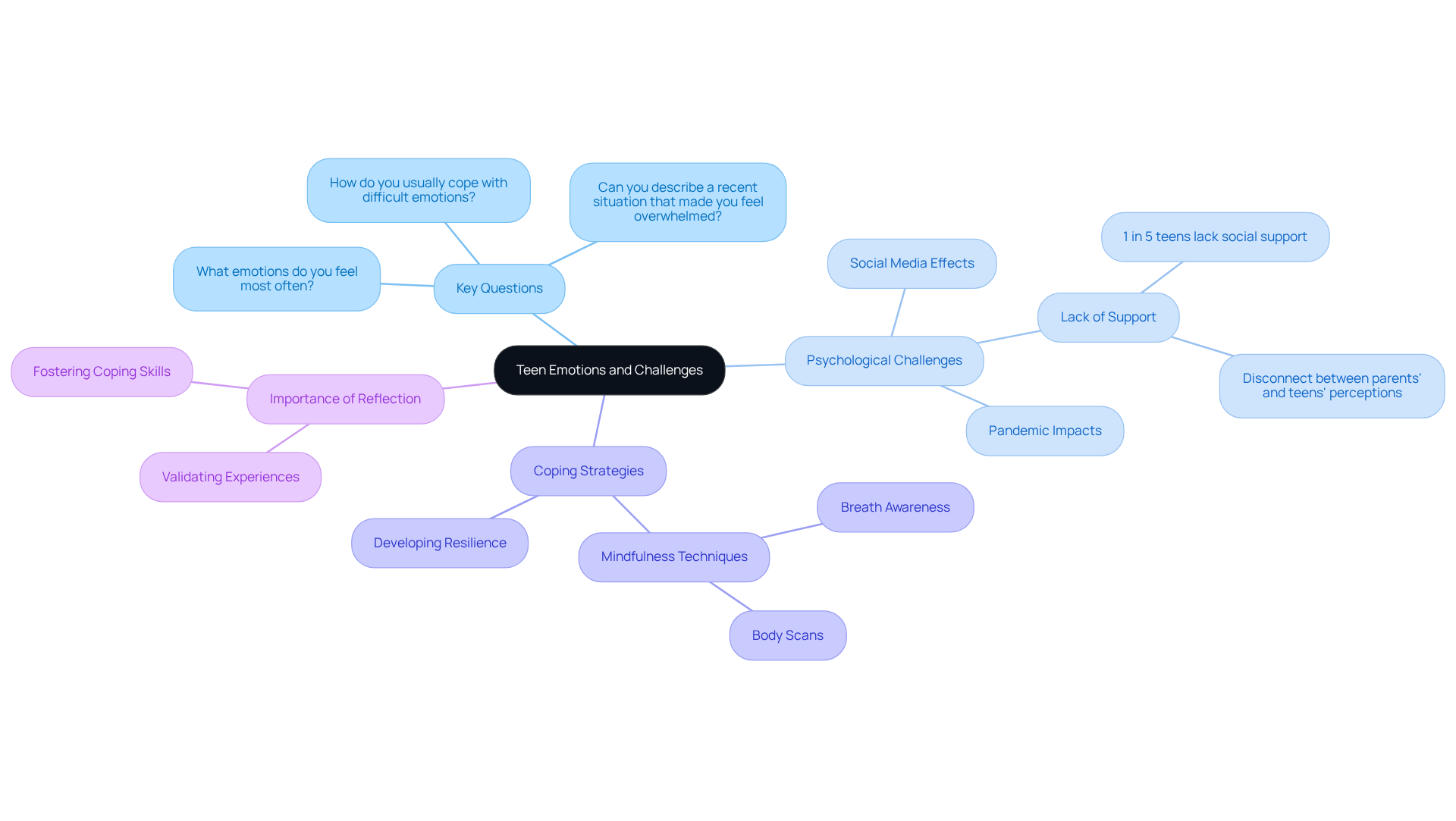
Questions to Navigate Teen Relationships and Social Dynamics
- How do you feel about your friendships? Understanding the emotions tied to friendships is crucial for teens, as positive relationships significantly enhance overall well-being. Engaging in mindfulness practices, such as meditation, can help you become more aware of your emotions in these relationships, fostering deeper connections and better emotional management.
- Are there any conflicts with friends or family that you would like to discuss? Addressing conflicts openly can nurture healthier communication and resolution skills. Mindfulness techniques, such as taking a moment to breathe and reflect before responding, can prepare you to approach these discussions with clarity and calmness.
- How do you handle peer pressure? Discussing strategies for managing peer pressure is vital, as it can greatly impact mental health and decision-making. Mindfulness can empower you to pause and assess your feelings and thoughts in these situations, helping you make choices that resonate with your values.
- What qualities do you value in a friend? Recognizing these characteristics can assist young individuals in developing meaningful relationships. Mindfulness can enhance your self-awareness, allowing you to identify what you truly seek in friendships.
- Have you ever felt pressured to act against your values? Exploring this can empower teens to stand firm in their beliefs. Mindfulness practices can help you observe these pressures without judgment, enabling you to respond in a way that honors your values.
- How do you feel when friends disagree with you? Understanding your emotional responses to disagreement can enhance your conflict resolution skills. Mindfulness can assist you in recognizing your feelings in the moment, providing space to respond thoughtfully rather than reactively.
- What role does social media play in your friendships? Discussing this can reveal the complexities of modern relationships and their effects on mental health. Mindfulness can help you become more aware of how social media influences your emotions and relationships, guiding you to make healthier choices.
These therapy questions for teens not only encourage open conversation but also inspire young individuals to reflect on their social interactions, ultimately promoting personal development and resilience. By integrating mindfulness into these discussions, you can deepen your understanding of yourself and your relationships.
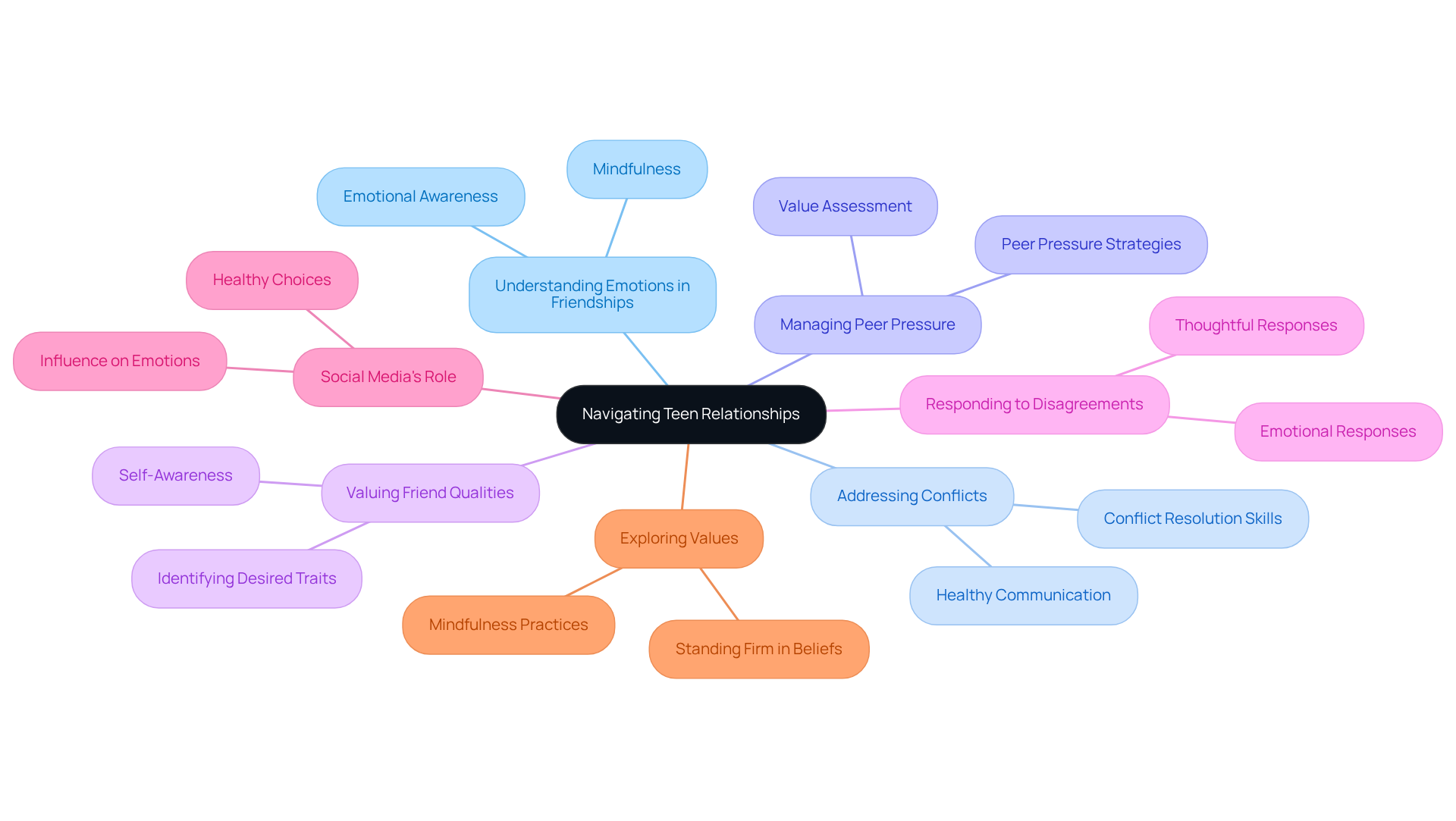
Questions to Encourage Teens to Share Future Goals and Aspirations
- What dreams do you hold for your future?
- What steps do you feel you need to take to bring those dreams to life?
- Who inspires you to chase your aspirations?
- How do you feel when you envision your future?
- What challenges do you foresee in your journey towards your goals?
- How might you overcome those obstacles?
- What skills do you think are essential for the career you desire?
- How do your interests align with your future ambitions?
- What role do your friends and family play in your dreams?
- How can you stay motivated when faced with setbacks?
These therapy questions for teens encourage them to express their ambitions while also nurturing a sense of purpose and motivation. Research shows that goal-setting is vital for emotional well-being in adolescents, as it offers direction and boosts self-esteem. Seth Hicks suggests that a thorough evaluation of career options can help prioritize choices based on their pros and cons, which is key for effective goal-setting. By engaging in meaningful discussions and exploring therapy questions for teens about their aspirations, young people can develop a clearer understanding of their motivations and the steps needed to fulfill their dreams.
Effective strategies for nurturing these aspirations involve creating a supportive environment where young individuals feel safe to share their thoughts and feelings. This also encourages them to reflect on their passions and values. Consulting with family elders and mentors can provide invaluable insights into potential career paths, empowering young individuals to take actionable steps toward their future. This approach not only motivates young individuals to articulate their ambitions but also equips them with the necessary resources to navigate the evolving employment landscape.
![]()
Essential Questions for Managing Stress and Anxiety in Teens
What situations trigger your anxiety? How do you usually cope with stress? Which coping strategies have proven effective for you? These important therapy questions for teens encourage young individuals to reflect on their experiences with anxiety, fostering open discussions about stress management. By recognizing triggers and responses, adolescents can gain a deeper understanding of their emotions and explore healthier coping strategies.
Research shows that effective coping methods, such as mindfulness and cognitive-behavioral techniques, can significantly alleviate anxiety levels. Mindfulness practices, including meditation and mindful breathing, can be integrated into therapy to enhance emotional regulation and personal growth, allowing young people to pause and gain clarity on their thoughts and feelings.
Mental health experts, like Dr. Victoria Chialy Smith, emphasize that 'self-compassion is a powerful tool for resilience, especially during times of stress, self-doubt, or transition.' Engaging in therapy questions for teens not only nurtures personal development but also equips young individuals to manage their anxiety more effectively.
The Emerald Couch offers valuable resources, including a free library for mental well-being, to support young people on their journey, ensuring a tailored approach to therapy that addresses trauma and anxiety.
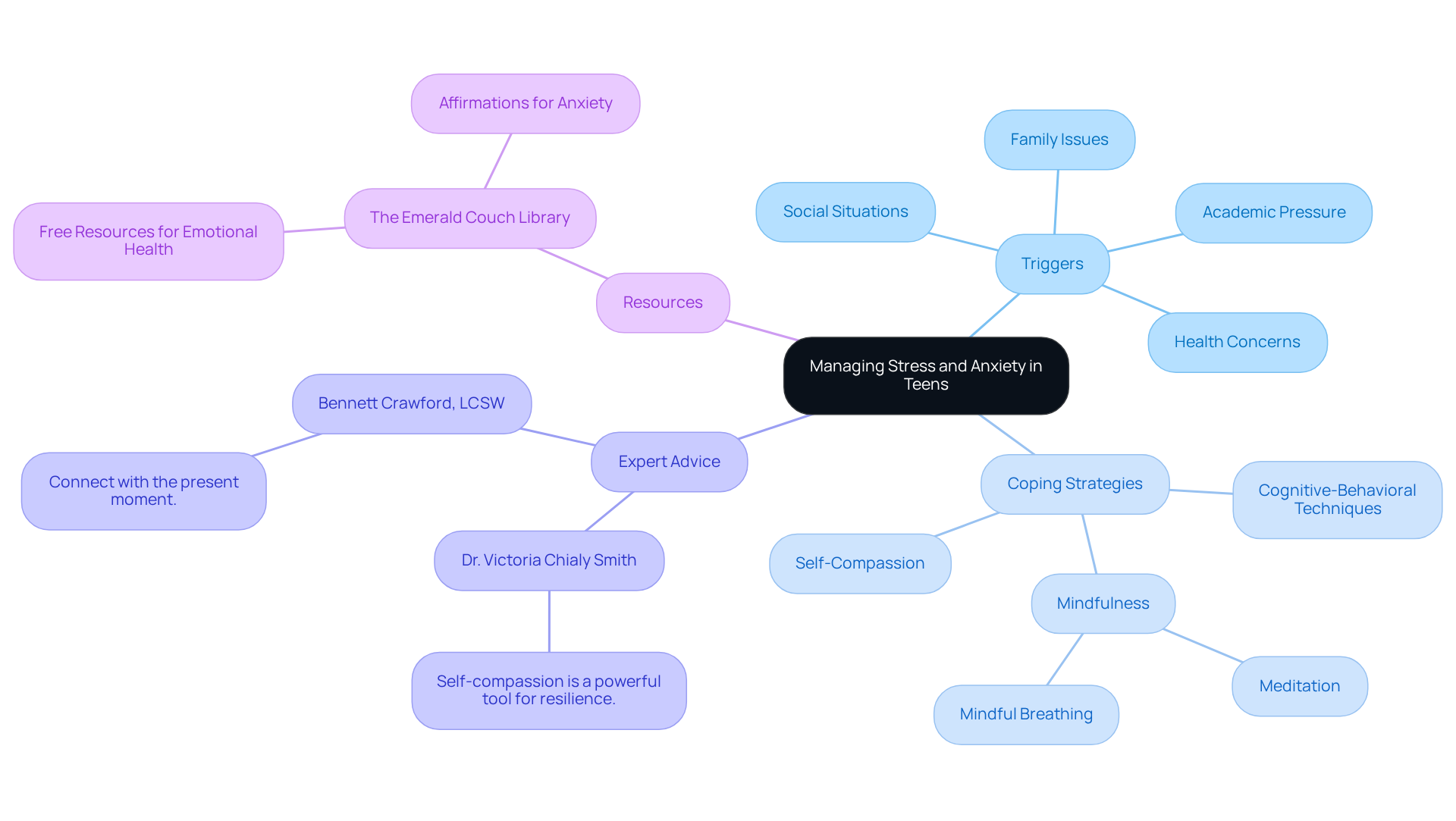
Questions to Facilitate Self-Identity Exploration in Teens
- How would you describe yourself in three words?
- What aspects of your identity are most important to you?
- How do you think others perceive you?
- What are your core values, and how do they shape your decisions?
- In what situations do you feel most confident?
- How do your emotions influence your behavior in different contexts?
- What are your strengths, and how can you leverage them?
- How do you handle criticism or negative feedback?
- What are your passions, and how do they reflect who you are?
- How do you envision your future self?
These therapy questions for teens gently encourage young individuals to explore their identities and develop self-awareness, which is essential for emotional growth. Self-awareness acts as a mirror, helping individuals understand their behaviors and their impact on others. Engaging with therapy questions for teens allows adolescents to clarify their feelings and values, which fosters confidence and resilience.
Incorporating mindfulness practices, such as breath awareness and body scans, can enhance this self-exploration process. For example, while considering their strengths, young individuals can engage in mindful breathing to center themselves, enabling a clearer comprehension of their abilities.
As Debbie Ford remarked, self-awareness enables a truthful assessment of one's life, creating opportunities for personal development and enhanced intelligence. Developing self-awareness is a gradual process that can significantly impact mental health, helping to mitigate issues such as depression and anxiety. Mindfulness techniques offer practical strategies that enhance emotional well-being, rendering them valuable resources for young individuals on their path of self-discovery.
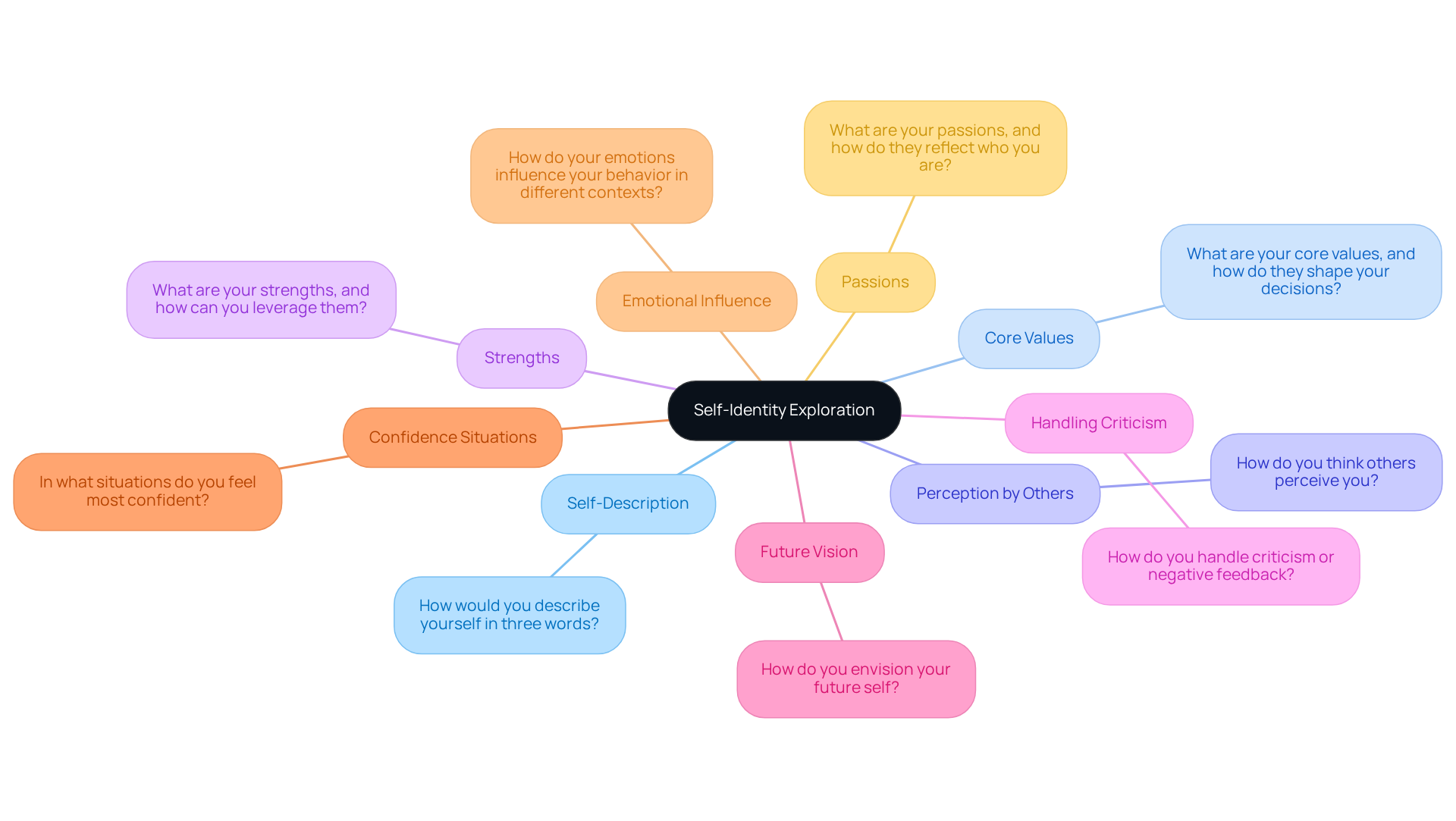
Questions to Foster Open Communication and Trust in Therapy
- What do you need from me to feel comfortable sharing?
- How can I support you better during our sessions?
- What therapy questions for teens do you find difficult to discuss?
These therapy questions for teens are essential in fostering a trusting therapeutic relationship. This trust is crucial for encouraging young individuals to share their experiences openly, especially when discussing therapy questions for teens. By creating a safe and supportive environment, therapists can enhance communication, allowing adolescents to express their thoughts and emotions without fear of judgment. This open dialogue not only strengthens the therapeutic alliance but also significantly influences treatment outcomes, empowering teens to engage actively in their healing journey.
Effective communication strategies, such as active listening and clarification, play a vital role in promoting understanding and connection. This ensures that the therapeutic relationship remains both productive and supportive, allowing for a nurturing space where healing can flourish.
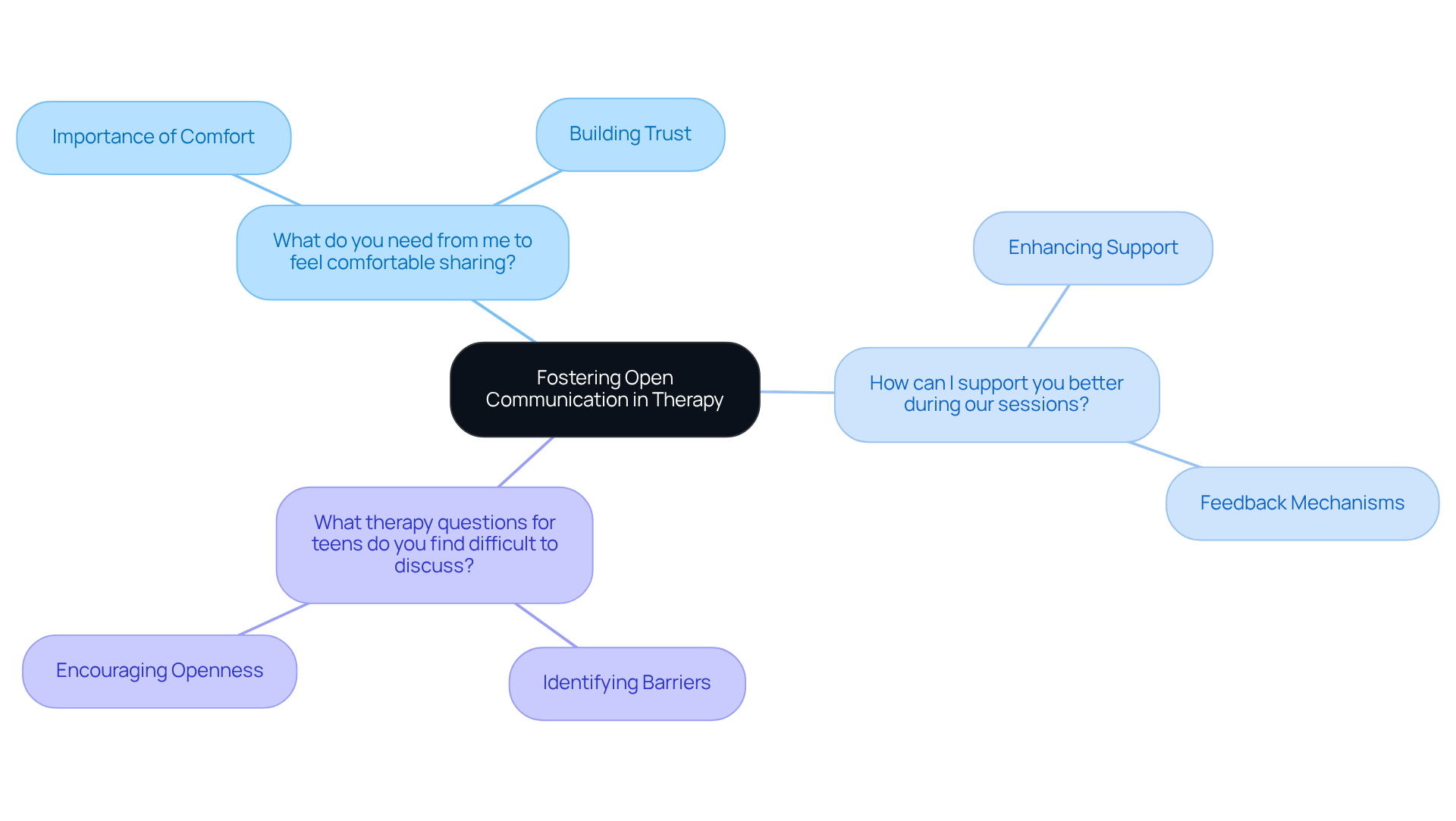
Questions to Discuss Coping Strategies and Resilience in Teens
- What coping strategies do you currently use to manage stress and challenges? Consider incorporating mindfulness techniques into your routine, such as breath awareness or body scans. Practicing breath awareness can help anchor you in the present moment, allowing you to observe your feelings without judgment. This approach is particularly beneficial when faced with stressors.
- Can you recall a specific instance when you successfully overcame a significant challenge? Reflecting on how you utilized mindfulness during that time can offer valuable insights into your resilience. Perhaps you engaged in mindful observation, focusing on your surroundings to calm your mind and regain clarity.
- How do you typically bounce back from setbacks or disappointments? Integrating everyday mindfulness activities, like savoring your morning tea or being present during a walk, can enhance your ability to cope with setbacks. These practices not only help you stay grounded but also reinforce your capacity to adapt positively to challenges.
These therapy questions for teens are designed to encourage young people to contemplate their resilience and recognize effective coping strategies. Research indicates that fostering resilience from an early age can significantly enhance emotional growth and stress management. By using therapy questions for teens to encourage adolescents to articulate their experiences and strategies, they can develop a stronger sense of competence and confidence.
Moreover, discussing resilience can help young people understand that setbacks are a natural aspect of life. As noted by psychologists, resilience is not merely about enduring difficulties but also about adapting positively to challenges. Engaging in these reflective discussions can empower young individuals to cultivate a growth mindset, strengthening their confidence in their ability to overcome challenges and succeed despite difficulties. Furthermore, having at least one good friend can increase resilience in teens, highlighting the importance of social support in navigating challenges.
To apply these mindfulness techniques in your daily life, start by setting aside a few moments each day to practice breath awareness or engage in mindful observation. Even small steps can lead to significant enhancements in your mental well-being.
Questions to Encourage Emotional Expression and Understanding
- How do you typically express your emotions?
- Are there specific emotions that you find challenging to share?
- What strategies or settings assist you in being more comfortable when discussing your emotions?
These therapy questions for teens are designed to foster open conversations about feelings, empowering young people to express their emotions more effectively. Research shows that many adolescents face hurdles in sharing their feelings, often stemming from fears of judgment or a lack of understanding. By creating a secure environment for discussing therapy questions for teens, therapists can support young individuals in exploring their emotions.
Effective approaches to enhancing mood regulation include:
- Role-playing scenarios
- Journaling
- Mindfulness practices
These methods help young individuals identify and manage their feelings. Mental health experts emphasize the importance of acknowledging emotions and encouraging self-reflection, which can significantly enhance awareness and resilience in adolescents.
As we explore this further, consider how these strategies might resonate with your own experiences. Have you ever felt overwhelmed by your past? By nurturing these conversations, we can create a pathway for healing and understanding.
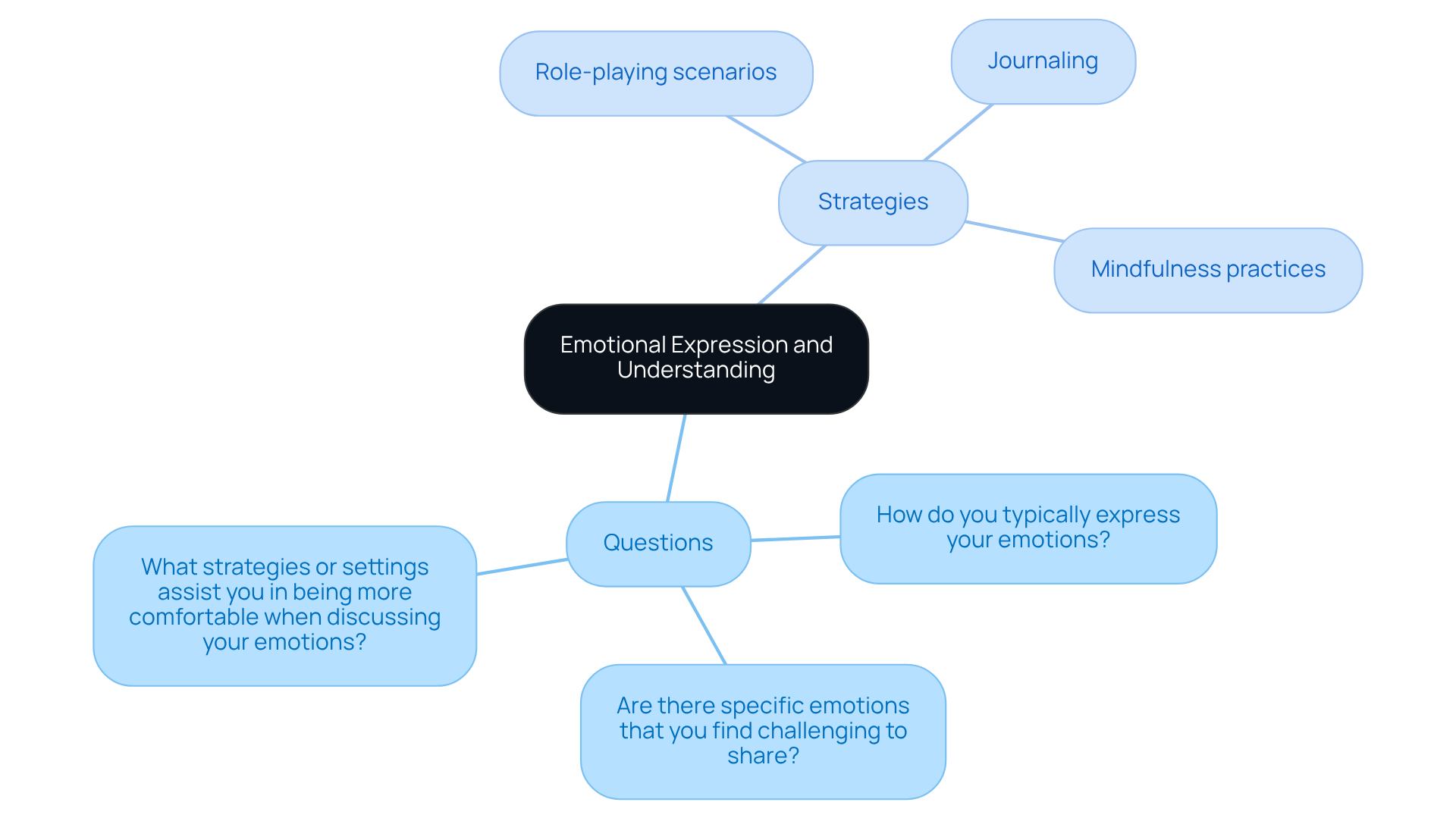
Reflective Questions to Promote Personal Growth in Teens
Reflective questions serve as vital tools for nurturing personal development in young individuals, encouraging them to delve into their experiences and aspirations. Have you ever asked yourself, 'What have I learned about myself recently?' or 'How do I envision my growth over the next year?' Engaging with such inquiries can significantly enhance self-awareness and help adolescents identify areas for improvement. This reflective journey not only fosters personal growth but also empowers them to take ownership of their development. As John Dewey wisely noted, 'We do not learn from experience…we learn from reflecting on experience.'
Incorporating mindfulness practices into these discussions can further enrich the therapeutic experience. Mindfulness allows young individuals to cultivate awareness of their thoughts and emotions, enabling them to observe their inner world without judgment. This awareness can lead to improved emotional regulation, stress management, and resilience—essential skills for navigating the complexities of adolescence.
Participating in therapy can support young individuals in developing coping strategies and enhancing their social interactions, making therapy questions for teens crucial for fostering their emotional growth. It is important to approach these discussions with patience and empathy, as building a healthy relationship with teenage clients is essential for effective therapy, particularly when using therapy questions for teens. However, it is also vital to recognize the potential pitfalls of self-reflection, such as rumination, which can impede personal growth if not properly managed. By integrating mindfulness into the therapeutic process, teens can learn to slow down, acknowledge their feelings, and make conscious choices about their growth journey. Moreover, the collaborative treatment planning process ensures that these reflective practices are customized to meet each individual's unique needs and goals.
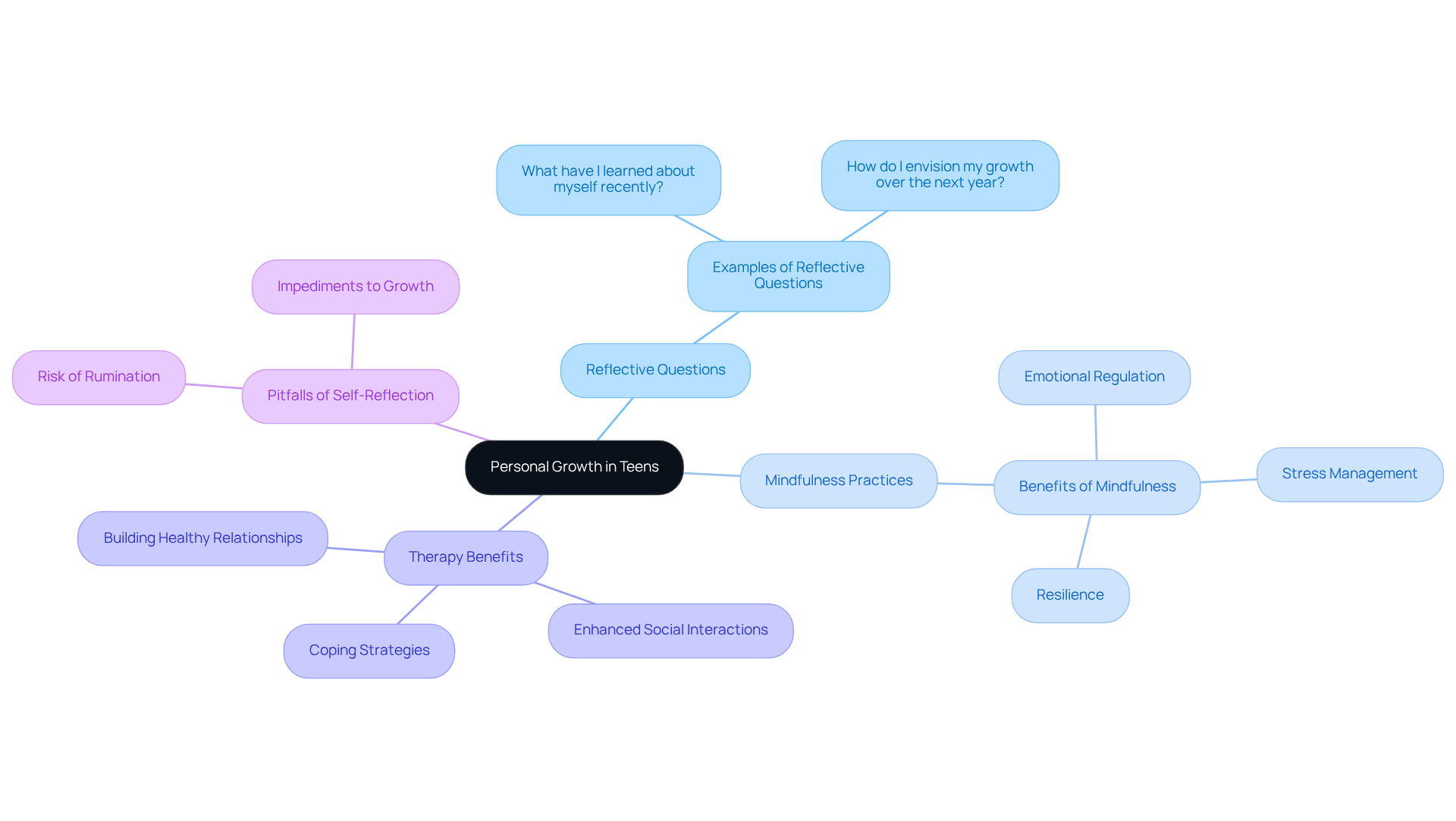
Conclusion
The insights shared throughout this article illuminate the profound impact that tailored therapy questions can have on the emotional growth of teens. By utilizing specific inquiries that resonate with adolescents, therapists can create a safe and supportive environment where young individuals feel encouraged to explore their feelings, relationships, and aspirations. This personalized approach not only strengthens the therapeutic alliance but also fosters resilience and self-discovery among teens.
Key themes discussed include:
- The importance of understanding emotions
- Navigating social dynamics
- Encouraging open communication
Have you ever felt overwhelmed by your past? The questions presented serve as essential tools for promoting emotional expression, managing stress and anxiety, and facilitating self-identity exploration. Moreover, integrating mindfulness techniques enhances these therapeutic conversations, allowing teens to cultivate greater awareness of their thoughts and feelings, which is crucial for their overall well-being.
Ultimately, fostering emotional growth in adolescents through targeted therapy questions is vital for their development into resilient and self-aware individuals. By prioritizing these conversations, caregivers and therapists can empower young people to articulate their experiences, navigate challenges, and embrace their unique identities. This commitment to nurturing emotional health will not only benefit the individuals involved but also contribute to a more understanding and supportive community for all teens.
Frequently Asked Questions
What is the purpose of therapy questions for teens at The Emerald Couch?
The therapy questions for teens at The Emerald Couch are designed to resonate with adolescents, helping them feel understood and supported while addressing their unique psychological needs. This approach fosters deeper connections and facilitates meaningful discussions that promote healing and growth.
How do therapy questions influence personal development in teens?
Therapy questions significantly impact personal development by allowing adolescents to explore their feelings and experiences in a safe environment. Techniques like empathetic listening and strategic questioning empower teens to express their ideas, fostering resilience and self-discovery.
What are some key questions to explore teen emotions and challenges?
Some key questions include:
- What emotions do you feel most often?
- Can you describe a recent situation that made you feel overwhelmed?
- How do you usually cope with difficult emotions?
Why is understanding emotional landscapes important for therapists?
Understanding a teen's emotional landscape is crucial for therapists as it shapes personalized interventions and helps them respond effectively to the therapy questions posed by the teens.
What psychological challenges do today’s teenagers face?
Today’s teenagers often face heightened psychological challenges exacerbated by social media pressures and the lasting impacts of the pandemic. About 1 in 5 teens report rarely receiving the social and psychological support they need, which can lead to significant mental health issues.
How can mindfulness techniques benefit teens in therapy?
Mindfulness techniques, such as breath awareness and body scans, help teens slow down and become more present. These practices enable them to observe their thoughts and emotions without judgment, assisting in stress management and emotional regulation.
What questions can help navigate teen relationships and social dynamics?
Questions to explore relationships include:
- How do you feel about your friendships?
- Are there any conflicts with friends or family that you would like to discuss?
- How do you handle peer pressure?
- What qualities do you value in a friend?
- Have you ever felt pressured to act against your values?
- How do you feel when friends disagree with you?
- What role does social media play in your friendships?
How do these therapy questions promote personal development?
These therapy questions encourage open conversation and inspire teens to reflect on their social interactions, ultimately promoting personal development and resilience. Integrating mindfulness into these discussions helps deepen their understanding of themselves and their relationships.




